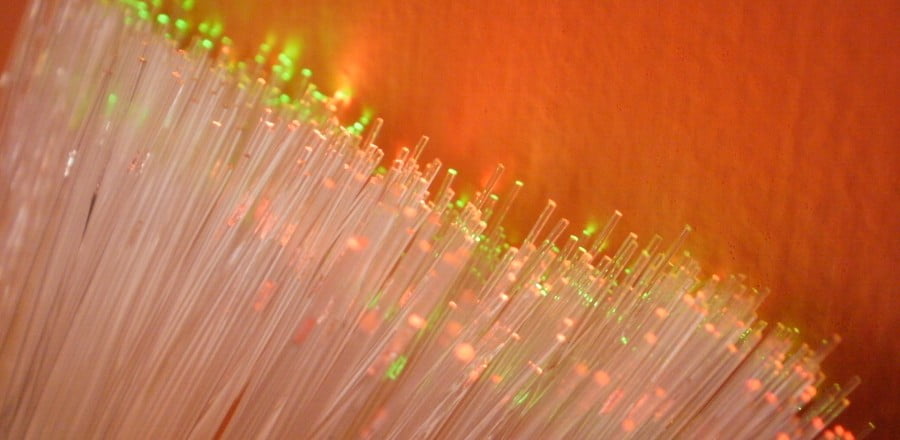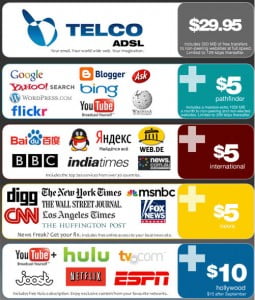As is so often the case, the comedy shows tell the story clearly, with great examples and a clear call to action. Watch this clip from Last Week Tonight With John Oliver and you’ll laugh while wanting to cry.

An Update On Net Neutrality
Net Neutrality is one of those things that I care about and think is important, yet find a bit too large to grasp. Since it has been in the news recently, with a new Notice of Proposed Rulemaking from the FCC (see why it’s hard to grasp?) and related editorials about the threat to the Internet as we know it, I thought it would be a good time to review.
First, a definition of Net Neutrality from Wikipedia:
Net neutrality (also network neutrality or Internet neutrality) is the principle that Internet service providers and governments should treat all data on the Internet equally, not discriminating or charging deferentially by user, content, site, platform, application, type of attached equipment, and modes of communication. The term was coined by Columbia media law professor Tim Wu.
 Why should we care? Take a look at the scary infographic to the right. Do you doubt that your ISP would jump at the chance to boost its revenue by charging à la carte for popular services? There are obvious conflicts between an ISP that also provides content (*coughComcast*) and content providers like Netflix and Amazon Prime, who rely on the ISPs to deliver their data. There is no conclusive evidence today that content providers are being throttled (and Verizon strenuously denies it) but that may be because the FCC hasn’t issued any rulings that have been upheld in court.
Why should we care? Take a look at the scary infographic to the right. Do you doubt that your ISP would jump at the chance to boost its revenue by charging à la carte for popular services? There are obvious conflicts between an ISP that also provides content (*coughComcast*) and content providers like Netflix and Amazon Prime, who rely on the ISPs to deliver their data. There is no conclusive evidence today that content providers are being throttled (and Verizon strenuously denies it) but that may be because the FCC hasn’t issued any rulings that have been upheld in court.
The FCC has tried to come up with rules that will enforce the principals of Net Neutrality but hasn’t been able to get it quite right. In January, a federal appeals court ruled that the FCC had exceeded its authority, writing:
Even though the Commission has general authority to regulate in this arena, it may not impose requirements that contravene express statutory mandates. Given that the Commission has chosen to classify broadband providers in a manner that exempts them from treatment as common carriers, the Communications Act expressly prohibits the Commission from nonetheless regulating them as such. Because the Commission has failed to establish that the anti-discrimination and anti-blocking rules do not impose per se common carrier obligations, we vacate those portions of the Open Internet Order.
What this means (I think) is that the FCC doesn’t have the authority to apply these rules to the class of companies that they were trying to. They would need to classify companies like Verizon and Comcast as common carriers, as they do phone companies. The FCC has decided not to appeal this ruling but rather to propose new rulemaking called “Protecting and Promoting the Open Internet.”
The DC Circuit recognized the importance of the Open Internet Order’s ban on blocking Internet traffic, but ruled that the Commission had not provided sufficient legal rationale for its existence. We will carefully consider how, consistent with the court opinion, we can ensure that edge providers are not unfairly blocked, explicitly or implicitly,from reaching consumers, as well as ensuring that consumers can continue to access any lawful content and services they choose.
So, the FCC is rewriting its rules and hoping they can codify agreements like those that they have in place with Comcast, which were made as part of its acquisition of NBC Universal. However, as ReadWrite points out:
The problem with that approach: The primary reason the FCC’s ability to regulate net neutrality was shot down by the DC Circuit appeals court was in how the Commission classifies broadband providers like Time Warner Cable, AT&T, and Comcast. The FCC does not classify these companies as public utilities (like water or power companies) but more as content and media companies.
Activist groups and Democratic members of Congress have asked the FCC to reclassify the Internet providers in a way that would make them subject to more government regulation and oversight, but it has not yet done so, which strikes us as puzzling, given that a court has shot down its ability to regulate these companies as things stand.
Will the FCC’s new rules make a difference in net neutrality, or is the Commission just attempting to assert its relevance on a topic that it believes it should have the power to enforce?
The FCC is seeking public comment and expects to have the new rules written by early summer. We should expect to hear more then.
FCC Support for Net Neutrality

Net neutrality was in the news quite a bit in 2007-2008. A neutral network is one that is free of restrictions on content, sites, or platforms, on the kinds of equipment that may be attached, and on the modes of communication allowed.
In what is very good news for the future of open access to the Internet. FCC Chairman Julius Genachowski has posted a statement on Broadband.gov (cross-posted on Whitehouse.gov and Huffington Post) entitled, The Open Internet: Preserving the Freedom to Innovate. In it, he suggests that the role of the FCC is be the “smart cop on the beat” in supporting free and open access to the Internet. To this end, he proposes two new FCC rules:
The first says broadband providers cannot discriminate against particular Internet content or applications. The second says broadband providers must be transparent about their network management practices. These principles would apply to the Internet however it is accessed, though how they apply may differ depending on the access platform or technology used. Of course, network operators will be permitted to implement reasonable network management practices to address issues such as spam, address copyright infringement, and otherwise ensure a safe and secure network for all users.
I also proposed that the FCC formally enshrine the four pre-existing agency policies that say network operators cannot prevent users from accessing the lawful Internet content, applications, and services of their choice, nor can they prohibit users from attaching non-harmful devices to the network.
Chairman Genachowski believes that these rules are necessary to prevent the recurrence of previous abuses:
We’ve already seen some clear examples of deviations from the Internet’s historic openness. We have witnessed certain broadband providers unilaterally block access to VoIP applications and implement technical measures that degrade the performance of peer-to-peer software distributing lawful content. We have even seen one service provider deny users access to political content.
The FCC has also created a new site, Openinternet.gov, as a place to participate in discussions about a free and open Internet. I plan to spend some time checking it out and I hope you will too.